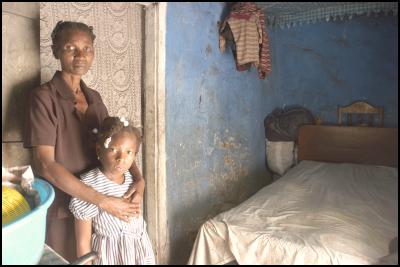Warning Signs Of Food Shortages In Haiti's North

CAPTION: Already vulnerable families - like those who lost crops during flooding two months ago - have nothing to fall back on. Grandmother Suzette Jean, caring for eleven people in her home, sits with her eight-year-old granddaughter. "We haven't got any food. We planted rice, but the rains came heavily and flooded our crops. Now we can't find enough to eat."
WV Sees Warning Signs Of Shortages In Haiti's North
PORT-AU-PRINCE: World Vision is seeing warning signs of food and commodity shortages in the rebel-held north of Haiti, as a result of supply lines being cut off.
A World Vision team visited the town of Cap Haitian Wednesday, working with locally based colleagues to assess the impact of the current political crisis on families living in the town and surrounding rural areas.
Roads have been blocked due to the escalating political instability that has taken hold of Haiti over the last three weeks, isolating the northern region from food, fuel and other supply routes.
"Everything's more expensive now," said one elderly lady, selling sweet potatoes in the main market.
Though Cap Haitian's market was busy as normal Wednesday, three days after armed rebels took control of Haiti's second city, high prices are already reducing people's capacity to buy enough food.
For now, stalls have plenty of goods like flour, rice, sugar, and salt as well as fresh produce like tomatoes, yams, sweet potatoes, peppers. But the prices have increased dramatically.
Market sellers buying a sack of flour to resell now have to pay 1200 gourdes*, gone up from 250 gourdes a sack, and are forced to pass the price increases onto buyers. A cup of peas now costs 20 gourdes, gone up from 7 gourdes. A sack of rice now costs 1250 gourdes, (30 USD) gone up from 400 gourdes (10 USD). Customers buying a cup of rice now have to pay 12 gourdes instead of 10. Essentials like salt have seen the biggest increases - 15 times ? to 15 gourdes.
Poor families in rural areas are also experiencing depleted food stocks, largely as a result of increase in food prices. Even getting to the markets costs more, as fuel shortages make transport more expensive. The cost of a tap-tap ride, the local public transport, into town now costs 40 gourdes (1 USD) instead of 10 gourdes.
Already vulnerable families ? like those who lost crops during flooding two months ago ? have nothing to fall back on. Grandmother Suzette Jean, caring for eleven people in her home, sits with her eight-year-old granddaughter. "We haven't got any food. We planted rice, but the rains came heavily and flooded our crops. Now we can't find enough to eat."
One father added, " We're trying to do enough for our families, but when you have six children, you can't do much with the money you have." He grows sweet potatoes in his field, but it's not enough to feed his family.
One community leader living in a rural area 10 miles outside Cap Haitian said, "Now is the first time we are experiencing this situation, despite the turbulent times we're used to here. Life is impossible."
*40 gourdes = 1USD


 World Vision: New Research Finds Children In Asia-Pacific Suffer Mentally And Physically Due To Climate Change
World Vision: New Research Finds Children In Asia-Pacific Suffer Mentally And Physically Due To Climate Change COP29: Navigating Ocean Finance - Investing In A Sustainable Blue Future
COP29: Navigating Ocean Finance - Investing In A Sustainable Blue Future Global Strategic Communications Council: One Year After Signing The Tripling Pledge, Governments’ Targets Are Unchanged, Even As Solar’s Prospects Are Upgraded
Global Strategic Communications Council: One Year After Signing The Tripling Pledge, Governments’ Targets Are Unchanged, Even As Solar’s Prospects Are Upgraded UN Climate Change: Financing The Future - Vera Songwe’s Vision For A Climate And Growth Agenda At COP29
UN Climate Change: Financing The Future - Vera Songwe’s Vision For A Climate And Growth Agenda At COP29 Glasgow Actions: At COP29, Global Activists Urge Strong Climate Finance Deal By Transforming Baku's Olympic Stadium Into Call For Action
Glasgow Actions: At COP29, Global Activists Urge Strong Climate Finance Deal By Transforming Baku's Olympic Stadium Into Call For Action Climate Action Network: COP29 - Repression Epidemic Regarding Climate Activists And Human Rights Defenders
Climate Action Network: COP29 - Repression Epidemic Regarding Climate Activists And Human Rights Defenders